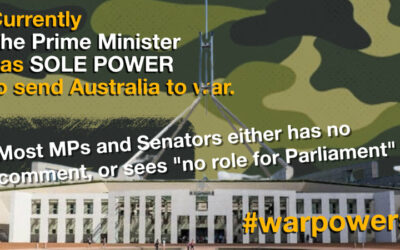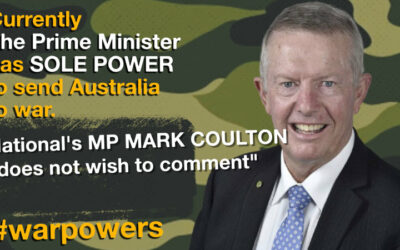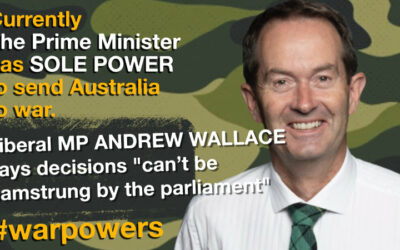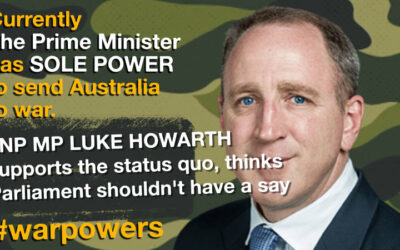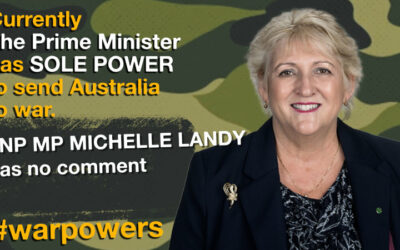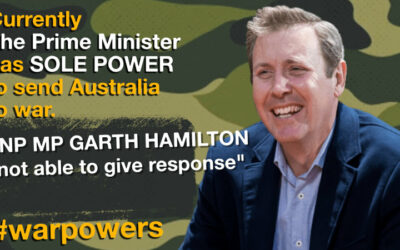The Senate hearing on War Powers reform is scheduled for early December, but reform advocates may be less enthused by the composition of the committee that is handling the inquiry. Zacharias Szumer has talked to many of those involved.
The Parliament’s censure of former Prime Minister Scott Morrison came this week, just in time for the impending inquiry into war powers reform. There can be no greater responsibility of a nation’s leadership than sending its citizens to war – and young Australian troops have been sent to fight foreign wars, such as invading Iraq, on false grounds.
Yet unlike the US and UK where, respectively Congress and British Parliament get to vote on taking their countries to war, in Australia the decision still remains with just one man, the Prime Minister. In light of Scott Morrison’s abuse of power by appointing himself secretly to a range of senior ministries, proper and transparent government process is “top of mind” for many Australians at the moment.
Despite this, observers of the war powers debate are highly concerned that the looming inquiry has been set up by the government to fail, the relevant committee overseeing the process stacked with opponents of reform.
At least four members of the Joint Standing Committee on Foreign Affairs, Defence and Trade’s subcommittee, including the deputy chair, are vocal opponents of reform, and the opinion of most other members is either unclear or unknown. However, Greens senator Jordon Steele-John – who has long championed parliamentary approval for overseas deployment of troops – has recently been added to the line-up.
A Liberal serving of opposition
Liberal MP Andrew Wallace, the deputy chair of the subcommittee recently told The Guardian that he was “surprised that the Labor Party is even contemplating” a change to a system that had “stood us in good stead for many many years”. He stated:
The executive has got to be given the power to govern the country and particularly in relation to national security issues. I don’t care whether it’s Labor or Liberal – they can’t be hamstrung by the parliament.
Some of Wallace’s party colleagues on the defence subcommittee are also opponents of reform, including senators David Fawcett, Linda Reynolds and Jim Molan.
Reynolds, who served as defence minister under Scott Morrison, recently told MWM that it was her “strong opinion” that “parliament should play no role in declaring war and in the engagement and deployment of defence personnel.”
I would be seriously concerned about the implications that reform would have in not only risking the lives of Australian personnel, but compromising the safety and security of any proposed operation.
Reynolds also made a speech in the Senate in 2014 opposing the Greens’ Parliamentary Approval of Overseas Service bill. “Decisions made by the government can always be tested on the floor of this chamber in line with the parliament’s ability to consider and debate important matters of state. But this should not ever extend to the ability to decide where, when and whether we deploy our defence forces,” she said at that time.
Fawcett also spoke against the Greens’ bill in 2014 and again in 2021 after it was reintroduced with some amendments. In the more recent speech, Fawcett said: “it’s important for Australia’s ability to shape, deter and respond to threats to Australia and our national interest that we do not remove from the executive the powers that it currently has.”
Last year, Senator Molan told MWM that he opposed a parliamentary vote, saying the “ability of parliament to make such a decision without the highest level of intelligence is the critical issue. The reason we have executive government in respect of war powers is because intelligence at the highest level can be managed effectively. At the parliamentary level, it cannot be managed.”
Labor’s ambivalent position
The subcommittee is chaired by Labor MP Julian Hill and also includes his party colleague Josh Wilson. The two MPs put forward a resolution at the 2021 ALP conference that got the inquiry added to the party’s policy platform. However, neither have come out as supporters of parliamentary war powers.
Last year, Hill told MWM that “at the very least we need to restore accountability to the parliament by way of requiring parliamentary debate and scrutiny of decisions of the executive with regard to deployment of military force.” However, he added that he wasn’t …
convinced that the responsibilities of executive government should be vetted and made subject to a parliamentary vote” as “this may risk national security being subject to nutters or popularists on the Senate crossbench.
“Over time it may also weaken the ability of an opposition that felt compelled to vote in favour of military action, to be able to hold the government to account in the months and years thereafter,” Hill added.
Wilson told MWM that “the very mild checks on Australia’s executive war-making power that have been in place through legislation and parliamentary convention have arguably weakened in the course of the 21st century”. For this reason, the parliament must “have a hard look at how we might turn that wheel in the direction of greater parliamentary involvement in the name of better and more transparent decision-making.”
The subcommittee also includes Labor MPs Robert Mitchell, Susan Templeman and Graham Perrett, who have all provided their opinions to MWM.
Mitchell said that “executive level government should have the authority to make an urgent decision as a last resort in grave circumstances” with “parliamentary scrutiny as soon as practically possible”. Templeman said that, while she sees “merit in having decisions about going to war debated and determined by parliament” it was “vital that the executive government has the necessary authority to make urgent decisions if required”.
Those statement aren’t necessarily out of line with those of reform advocates, who generally agree that the executive should retain power to deploy the military in emergency situations. It remains to be seen if those MPs believe such exceptions to parliamentary approval would be sufficient to protect Australia in emergency situations. When asked by The Guardian about such exceptions, Wallace shot back “what war isn’t an emergency?”.
Perrett’s opinion is slightly more slanted in favour of the executive retaining war powers, saying “he was “personally happy with the executive making the decision” as it is “important that the executive can respond promptly to hostility when necessary. However, they should consult and inform the Parliament throughout the entire process.”
“Private briefings should be given to the bipartisan Security Committee of any escalation of hostility,” Perrett added. “In 1940, at the urging of John Curtin, the then Labor opposition leader, Menzies formed an Advisory War Council comprising members of the government and opposition. Such an advisory committee would be appropriate in any prolonged conflict.”
Other members largely silent
Until recently, the subcommittee was absent of any Greens, who have long campaigned for war powers reform. Over the last decade, the party has twice introduced a bill that would require parliamentary approval of overseas troop deployments. Given the party’s strong result at the last election, and their long-standing position on the issue, their absence was hard not to notice. Especially because the party has long been excluded from related parliamentary committees, such as the joint standing committee on intelligence and security.
However, in late October, Steele-John, the party’s spokesperson for foreign affairs and peace, was quietly added to the defence subcommittee. Steele-John has previously told MWM that the party “firmly believe that a parliamentary vote should be required for the use of the Australian military overseas.”
The only other member of the defence subcommittee who has provided an opinion to MWM is Senator Ralph Babet, who was elected under the banner of the now-deregistered United Australia Party. A staffer from Babet’s office told MWM that the senator “believes a clear distinction should be made between war powers and matters of defence. It is apparent to us, as a newly elected party, that a multi partisan view of hope exists for future global peace and stability, within the halls of Parliament.” Make of that what you will.
To date, none of the other members of the defence subcommittee have provided MWM with their opinions on the issue. This generally tracks with the outcomes of MWM’s ongoing survey of parliamentary opinions on war powers reform; almost three-quarters of federal parliamentarians have either told MWM that they have no comment to make or haven’t responded at all. The graph below shows the findings from both houses of parliament to date.

As far as can be ascertained from the limited number of responses that were received, support for war powers reform is significantly higher among Greens, independents and minor party members than either of the two majors. Opposition to reform is also notably higher among the Coalition than the ALP, with eight Coalition MPs and Senators opposing reform, whereas only four Labor pollies expressed explicit opposition.
No Coalition members indicated that they welcomed discussion or an inquiry, whereas eight Labor members did. However, the opinion of the vast majority of parliamentarians remains unknown.
Zacharias Szumer is a freelance writer from Melbourne. In addition to Michael West Media, he has written for The Monthly, Overland, Jacobin, The Quietus, The South China Morning Post and other outlets.
He was also responsible for our War Power Reforms series.




